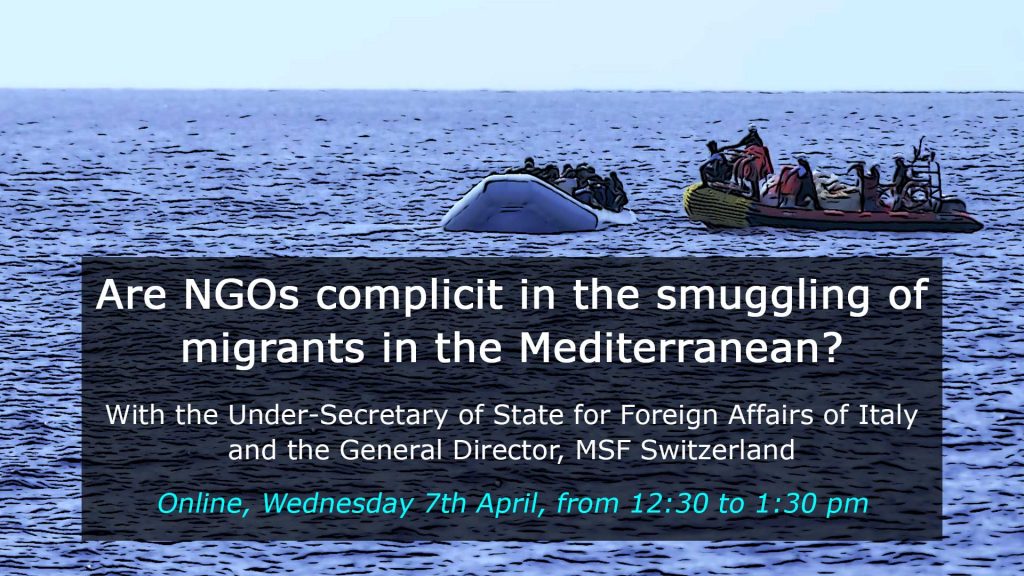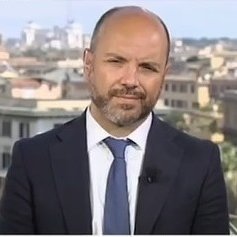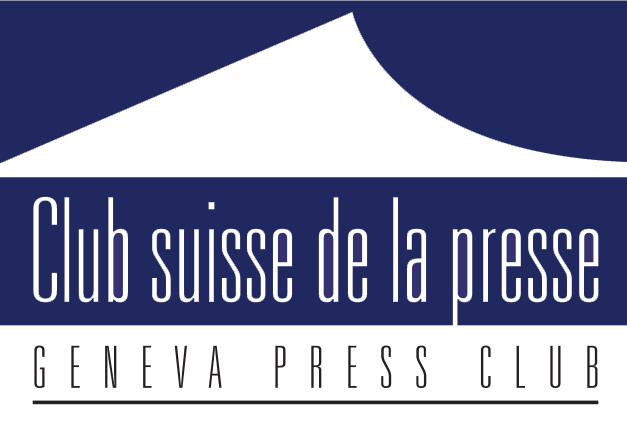Notes & Quotes from the debate « Are NGOs complicit in the smuggling of migrants in the Mediterranean? »

Notes & Quotes from the debate « Are NGOs complicit in the smuggling of migrants in the Mediterranean? »
By Luisa Ballin
In recent months, the pressure on NGOs trying to rescue refugees adrift in the Mediterranean has increased. Three NGOs (Médecins sans Frontières, Save the Children and Jugend Rettet) have been accused by the Italian justice of complicity with smugglers following a vast investigation involving a police officer who infiltrated a rescue ship. 21 activists, seafarers and NGO leaders have been summoned to court. The three NGOs had to give up their rescue operations. They are accused of playing into the hands of the smugglers with whom they would have put themselves in direct contact to recover their human cargo. Are these accusations true? How do these ships operate off the Libyan coast? How does the new Italian government of Mario Draghi intend to follow up on these measures against NGOs? Do they want to prevent any NGO from going to sea to provide assistance? Under what conditions can they now operate? Can Europe continue to turn a blind eye to the sea route where thousands of refugees are dying? How can the European Union relieve Italy or Greece, in the front line, of the burden of the survivors? These are some of the questions the Geneva Press Club has addressed with a panel moderated by its executive director Pierre Ruetschi.

“I hope it will be possible to resume a sort of public-private partnership and to make it possible for the NGOs to return and to operate in cooperation. We have a common goal to save lives”.
Mr. Benedetto della Vedova
Italian Under-Secretary of State for Foreign Affairs
“From a couple of weeks ago, things changed in Libya. I hope, and the Italian government will do its best in this respect, that now that we have – thanks to UN pressure – a new national unity government, we have an institutional interlocutor, probably not in charge completely of the security in all the country. My hope and my intention is to make work the relations between the Italian government and the Libyan government to establish security in the Mediterranean Sea. [To stop] weapons trafficking and human being trafficking, but also to change the conditions and the human rights of people waiting in the Libyan coasts. And we will push the European Union to accept new rules. We need a European Union response to the crisis in the Mediterranean Sea and in Libya”.
Mr. Benedetto della Vedova, Italian Under-Secretary of State for Foreign Affairs

“I am so glad that you are covering this subject today because it is not getting the coverage that it deserves. It is at the very heart of the European project and if we want to live up with the European ideal we have to look at this issue and we have to come up with a combined solution that is able to receive migrants with dignity, treat them fairly, process their cases, return those who do not qualify and keep those who do. But we have first to start saving lives to sea before we can ask those questions and go to judicial process for each person”.
Mr. Stephen Cornish
General Director, Médecins sans frontières (MSF) Switzerland
“The first responsibility would be on the European Union to reestablish searching rescue capacity and to share the wealth of those arriving, not the burden. Switzerland, although it is not part of the European Union initiative is certainly signatory of the Dublin convention and should also be called to play its role in international solidarity”.
Mr. Stephen Cornish, General Director, Médecins sans frontières (MSF) Switzerland

“It was the policy both of SOS MEDITERRANEE and MSF aboard of the Aquarius, to slash any boats on which we rescued people at sea. We destroyed the boats, and down the engine so that it cannot be reused by smugglers. MSF has never collaborated with smugglers, has never wanted to be in contact with smugglers. MSF has always awaited the go ahead from search and rescue coordination centers before proceeding to a rescue”.
Ms. Seraina Eldada
Cultural mediator on board the Aquarius (2018)
“The most urgent thing to do is that we need to prevent the loss of lives at sea. This cannot happen if no one is at sea to do the rescue. The long-term solution must implicate all levels of action: policy, institutionalization of processes and also actions of humanitarian actors, NGOs and other civil society organisations…We can see not only the situation of people in Libya, but I can attest to the fact that of the 10 to 15000 people whom I spoke, 99% of people had provable instances of torture or rape or trafficking or enslavement. This figure of 99% is accurate, this is not an exaggeration”.
Ms. Seraina Eldada, Cultural mediator on board the Aquarius (2018)

“This is not an emergency in terms of numbers, this is a humanitarian emergency. Politicians and public opinion should change their perception”.
Mr. Flavio Di Giacomo
“IOM Italy spokesperson
“This is very political. We cannot change the situation in Libya in this moment, because of the political instability that we have seen in the last few years and for the safety of our staff. The situation in Libya is dramatic. We always advocate for the detention centers to be closed as soon as possible and to be replaced with open centers where men could be separated from women and children and their vulnerability could be assessed…But we do not have any kind of power to change the situation there and unfortunately to provide the guarantees of human rights. We cannot do that. But we are prepared to be there and to alleviate the suffering of migrants who are in these centers”.
Mr. Flavio Di Giacomo, “IOM Italy spokesperson
